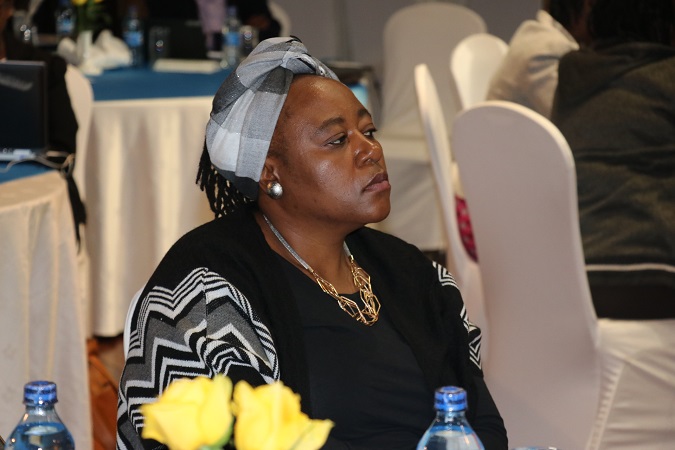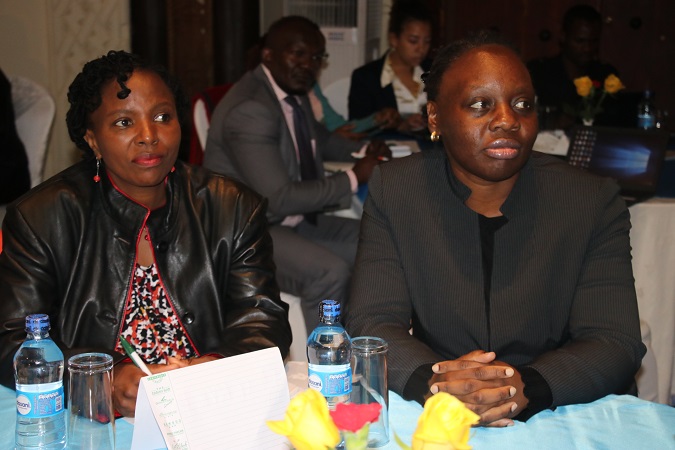Understanding the principle of Leaving No One Behind: UN Women meets stakeholders
UN Women Regional Office for Eastern and Southern Africa together with regional economic groups’ representatives, civil society organizations and United Nations agencies convened a second meeting to discuss progress of the SDGsDate:
The 2030 Agenda for Sustainable Development (SDGs) features the stand-alone Goal 5 to “Achieve gender equality and empower all women and girls (GEWE)” with 54 gender-specific targets, out of the 169 targets. It is important to note that all SDGs are relevant to the achievement of gender equality and the empowerment of women and girls, and that women’s substantive and effective contributions are critical to achieving this agenda.
The concept of localizing the SDGs refers to the process of aligning (or adjusting) national and sub-national government development frameworks to adapt the SDG targets and indicators to the local context and priorities. Localizing the SDGs involves promoting local multi-stakeholder ownership of the agenda – stepping down the globally agreed development agenda to the local in a way that they respond to local priority needs and interests. Localization also means allocating resources necessary to achieve outcomes at the national and local level. Lessons from the localization of Millennium Development Goals (MDGs) indicate that the involvement of the Civil Society Organizations (CSOs) and local governments in the process of localization, for instance, significantly contributed to the participation of local community organizations, and private sector actors and contributed to stronger accountability structures.
In June 27/28- 2018, UN Women in collaboration with key stakeholders and UN agencies held an SDG Consultative meeting in Nairobi- Kenya. The Regional Consultations on the Progress on the Localization of the SDGs focused on how Member States and Regional Economic Communities (RECs) in East and Southern Africa have made progress on gender equality and women’s empowerment related SDGs, Voluntary National Reviews (VNR) as a mechanism of reporting and SDG monitoring at national and regional levels, the role of research, data and statistics in accelerating progress towards localization of SDGs and building stronger accountability mechanisms.
The consultation brought together participants from 11 Member States including Botswana, Djibouti, Ethiopia, Kenya, Malawi, Rwanda, South Africa, Tanzania, Uganda, Zambia, and Zimbabwe. These included representatives from Ministries of Gender; Directors of National Statistical Offices; Regional Economic Communities and Bodies- RECs; Regional Institutions; Select Civil Society Organizations and International NGOs; and UN Officials from United Nations Economic Commission for Africa (UNECA), United Nations Development Programme (UNDP) and The United Nations Entity for Gender Equality and the Empowerment of Women (UN Women) Multi and Country Offices. It contributed towards building momentum for the High Level Political Forum for 2018 and motivating Member States for Voluntary National Reviews beyond 2018, prioritization of gender statistics and ensuring that no one is left behind in the localization and implementation of SDGs while ensuring that research and data remains critical for generating evidence for monitoring implementation and reporting on SDGs progress. From the consultations, a research agenda was developed based on the SDGs Gap Analysis-replicating UNDP finalized SDG Gap Analysis in Kenya and a possible study on the Role of Community and Citizen-Generated Data as a tool of accelerating localization and implementation of Gender Related SDGs in Africa.

The consultation was also used as a launch pad for a UN Women Internal Quality Assurance Group- Reference Group on SDGs and Gender Statistics. UN Women East and Southern Africa Regional Office (ESARO) has set up thematic regional reference groups comprised of a diverse team of high level technical experts in gender equality and women’s empowerment with relevant thematic experience in line with UN Women’s strategic priorities i.e. Sustainable Development Goals and Gender Statistics. To fulfill its mandate, UN Women utilizes the Thematic Regional Reference Groups as one of the avenues in sourcing key ideas on policy perspectives, quality assurance and timely advisory support on diverse issues including the SDGs. The thematic reference groups act as think tanks that enables UN Women to achieve the goal of ensuring women and girls benefit and attain the aspirations of the development frameworks in Africa including agenda 2030 on Sustainable Development; African Union’s Agenda 2063 among others.
Some common challenges for the implementation and localization of SDGs identified by the consultation include limited technical and financial resources; perceived challenges on prioritization of goals; and capacity gaps on localization, data and statistics on gender equality and women’s empowerment. This is in addition to policy incoherence in some Member States which create a conflict with priorities for investment in gender related SDGs. A further constraint regarding gender equality and women’s empowerment is the lack of standardized approaches to localization and implementation given that the only relevant lessons are those derived from the experience of operationalizing the MDGs.
It was reported that implementation and localization efforts remain uneven and at different stages, weakly-resourced and uncoordinated at both national and regional levels – all of which could hamper ownership, implementation efforts and accountability for the SDG agenda, and the attainment of the gender equality agenda in particular. This paucity of information constrains reporting on and accountability for the SDG targets.
